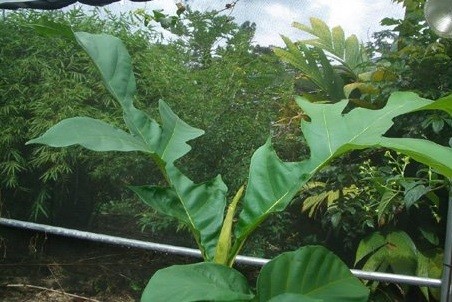Peluntan
(Artocarpus sericicarpus)

Description
Artocarpus sericarpus, the peluntan, pedalai, gumihan or terap bulu, is a tropical evergreen tree species of the family Moraceae. It is the cousin of jackfruit and breadfruit. The tree originates from northern Borneo (Sarawak), Malaysia (Sabah), the Philippines and Indonesia (Maluku Islands, Sulawesi, Kalimantan), and is most commonly found in humid tropics with a mild monsoon climate, occurring in tropical evergreen forests at 500–1,000 m elevation. It is also occasionally found in steep, clayey hillsides of inland areas. The discovery date is not clear as it is listed as 1959 in one book and 1961 in the other. It is a very large rainforest tree to 120 ft (37 metres). Similar to the marang fruit (Artocarpus odoratissimus), the pulp of the fruit is edible and considered very tasty but A. sericicarpus does not have strong odor of the marang. The seeds are also edible, people normally boil or roast them and consume them like peanuts. A. sericicarpus measures up to 30–40 m, stipule are lanceolate and measure at 6–12 cm and its dark green leaves are elliptic and ovate and measure at 20–70 cm by 10–50 cm. The tree's bark is also used to make barkcloth. The fruit is hairy, and looks like a giant rambutan. When the globular fruits (15 cm diameter) are ripe, the skins are bright orange, covered with hair. Pulp is white in color and tastes very sweet. Some say the Pedal fruit is the tastiest of all Artocarpus.
Taxonomic tree:







